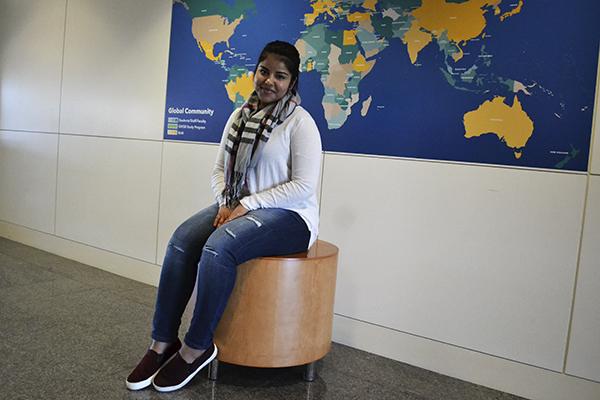Updated: Feb. 29, 2016 at 12:26 p.m.
With more students from abroad in GW’s business school, students and administrators are looking for better ways to make sure international graduates can land jobs in the U.S.
The number of international students enrolled in undergraduate, graduate and non-degree programs in the business school has increased by 63 percent since 2011. Officials said that as the number of international students grows, they are implementing more resources to help them find positions after they graduate.
Gil Yancey, the executive director of the business school’s Fowler Career Center, said the career center’s employer development consultant has been working to develop relationships with companies that will consider international students for internships and jobs.
Yancey said other projects in the works include developing workshops with language coaches to help students in job interviews, bringing international alumni back to help students develop career strategies through roundtable and one-on-one discussions and hosting an international student networking series.
“We continuously develop new learning and engagement programs for international students that prepare them to be competitive in the job and internship market,” Yancey said in an email.
Linda Livingstone, the dean of the business school, told students at an undergraduate town hall meeting in January that staff in the business school career services are working to identify employers outside of D.C. that will sponsor visas and encourage international students to apply there. She added that many jobs available in D.C. require a security clearance, something that is not available to students without citizenship.
“If our international students are willing to look outside of Washington D.C., it can actually be easier for them to find positions,” Livingstone said. “We’re trying to broaden geographically.”

Doubling GW’s international student population over the next decade is a pillar of GW’s strategic plan. To support swelling populations of international students in the past, officials laid out plans to connect international students with advisers to guide them through the visa process, increased English proficiency classes and invested in online programs.
Dustin Carnevale, a spokesman for the business school, said that business programs have responded to the rise in international student enrollment by focusing more on global and emerging economics in curricula.
“Business leaders and business education have also become more globally integrated and internationally focused,” Carnevale said in an email. “GWSB’s internationally diverse student body not only allows students the opportunity to learn and grow from classmates hailing from other regions of the world, but it also better prepares them for a globally focused marketplace.”
International students said they face difficulties in applying for jobs and internships because they aren’t U.S. citizens. The vast majority of international students are in the United States with student visas.
Ishaba Haque, the director of international students in the Student Association, said employment is the primary concern for international students. Haque, who is from Bangladesh, said that employers are reluctant to sponsor visas because of the uncertainty involved.
“It’s simply a lot for a company to sponsor one,” Haque said. “They have to invest a lot of money into that individual in a lottery system.”
Yiqing Ye, a student coordinator at the Fowler Center, said staff in the center have been discussing more ways to improve their services for international students. One change they have made this year is adding information about visa sponsorship to job descriptions on the business school’s GWork page.
“The last couple weekly meetings, we have discussed about how we can improve our service to international students,” said Ye. “Next semester, Fowler coordinators will modify the presentations for international students in order to let them feel included and understand the U.S. job market better.”







